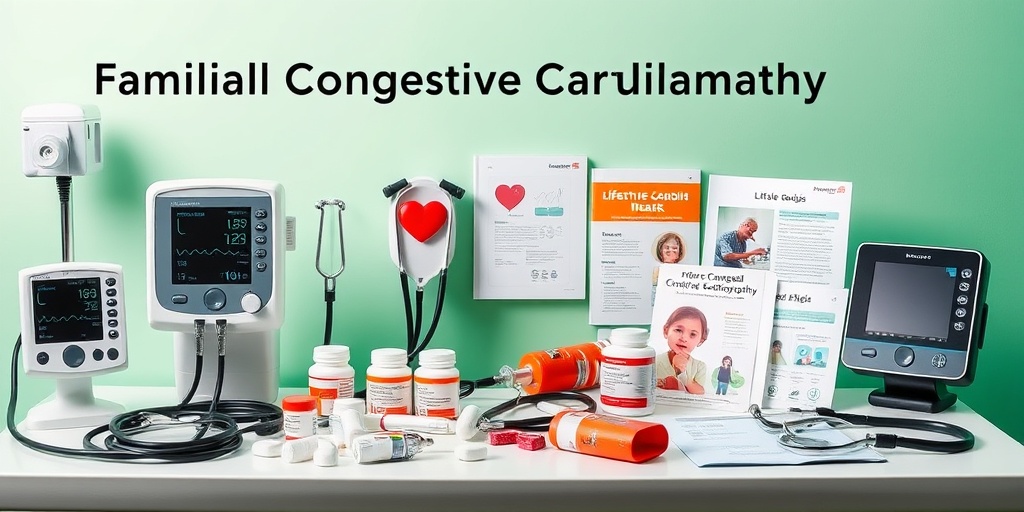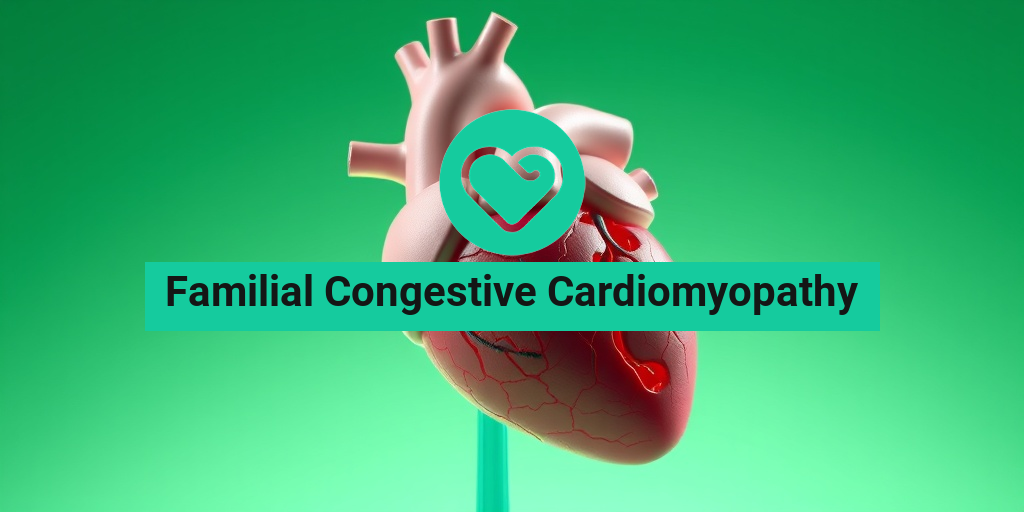What Is Familial Congestive Cardiomyopathy?
Familial Congestive Cardiomyopathy (FCCM) is a genetic heart condition that affects the heart muscle, leading to its enlargement and impaired function. This condition is a subset of familial dilated cardiomyopathy, which is characterized by the heart’s inability to pump blood effectively due to its weakened state. FCCM is often inherited, meaning it can run in families, making understanding its implications crucial for those with a family history of heart disease.
The Genetic Basis of FCCM
Familial Congestive Cardiomyopathy is primarily caused by mutations in specific genes that are essential for the structure and function of heart muscle cells. These genetic mutations can disrupt the normal functioning of the heart, leading to symptoms that can vary widely among individuals. Some of the most common genes associated with FCCM include:
- TTN (Titin): This gene is crucial for the elasticity and contraction of heart muscle.
- MYH7 (Beta-myosin heavy chain): Mutations here can lead to abnormal heart muscle function.
- LMNA (Lamin A/C): This gene is involved in maintaining the structural integrity of the heart cells.
Understanding the genetic underpinnings of FCCM is vital for diagnosis and treatment, as genetic testing can help identify at-risk individuals within families. If you suspect a genetic link in your family, consulting with a healthcare provider or a genetic counselor can provide valuable insights.
How Is FCCM Diagnosed?
Diagnosing Familial Congestive Cardiomyopathy typically involves a combination of medical history evaluation, physical examinations, and various diagnostic tests. Common diagnostic tools include:
- Echocardiogram: This ultrasound test provides images of the heart’s structure and function.
- Electrocardiogram (ECG): This test measures the electrical activity of the heart.
- Genetic Testing: Identifying specific gene mutations can confirm a diagnosis of FCCM.
Early diagnosis is crucial, as it allows for timely intervention and management strategies to improve quality of life and potentially extend life expectancy.
Symptoms of Familial Congestive Cardiomyopathy
The symptoms of Familial Congestive Cardiomyopathy can vary significantly from person to person, often depending on the severity of the condition. Some individuals may experience mild symptoms, while others may face more severe manifestations. Common symptoms include:
Common Symptoms
- Shortness of Breath: This is often experienced during physical activity or even at rest in advanced cases.
- Fatigue: A general feeling of tiredness that does not improve with rest.
- Swelling: Fluid retention can lead to swelling in the legs, ankles, and abdomen.
- Palpitations: Irregular heartbeats or a sensation of the heart racing.
- Chest Pain: Discomfort or pain in the chest, which may be mistaken for other conditions.
Age of Onset and Progression
The age of onset for Familial Congestive Cardiomyopathy can vary, with symptoms often appearing in late adolescence to early adulthood. However, some individuals may not show symptoms until later in life. The progression of the disease can also differ, with some experiencing rapid deterioration while others may have a more gradual decline in heart function.
When to Seek Medical Attention
If you or a family member experience any of the symptoms mentioned above, it is essential to seek medical attention promptly. Early intervention can significantly impact the management of the condition and improve overall outcomes. Regular check-ups and monitoring are crucial for those with a family history of FCCM.
For more information on managing heart health and understanding genetic conditions, consider visiting Yesil Health AI, a valuable resource for evidence-based health answers.
In conclusion, Familial Congestive Cardiomyopathy is a serious condition that requires awareness and proactive management. Understanding its symptoms and genetic basis can empower individuals and families to take charge of their heart health. ❤️

Causes and Risk Factors
Familial Congestive Cardiomyopathy (FCCM) is a complex condition that can significantly impact heart function. Understanding the causes and risk factors associated with this disease is crucial for early detection and management. While the exact cause of FCCM can vary from person to person, several key factors have been identified.
Genetic Predisposition
One of the primary causes of familial congestive cardiomyopathy is genetic predisposition. This condition often runs in families, indicating a hereditary component. Mutations in specific genes can lead to the development of cardiomyopathy. Some of the most commonly implicated genes include:
- MYH7 – This gene encodes a protein that is essential for heart muscle contraction.
- MYBPC3 – Mutations in this gene can disrupt the structure of heart muscle cells.
- TNNT2 – This gene is involved in the regulation of muscle contraction.
Individuals with a family history of familial dilated cardiomyopathy are at a higher risk of developing the condition themselves. Genetic counseling can be beneficial for those with a family history, as it helps assess the risk of passing the condition to future generations.
Environmental Factors
While genetics play a significant role, environmental factors can also contribute to the onset of FCCM. These may include:
- Chronic Stress: Prolonged stress can lead to increased heart strain.
- Obesity: Excess weight can put additional pressure on the heart.
- Substance Abuse: Alcohol and drug abuse can damage heart muscle over time.
Addressing these environmental factors can help mitigate the risk of developing familial dilated cardiomyopathy and improve overall heart health.
Age and Gender
The age of onset for familial dilated cardiomyopathy can vary, but it often presents in adulthood. Men are generally at a higher risk than women, although the reasons for this disparity are not entirely understood. Regular check-ups and monitoring are essential, especially for those with a family history of heart disease.
Genetic Links to Cardiomyopathy
Understanding the genetic links to familial congestive cardiomyopathy is vital for both diagnosis and treatment. Genetic mutations are the cornerstone of this condition, and advancements in genetic research have shed light on how these mutations affect heart function.
Identifying Genetic Mutations
Genetic testing can identify specific mutations associated with familial dilated cardiomyopathy. This testing is crucial for:
- Diagnosis: Confirming the presence of genetic mutations can help diagnose FCCM.
- Family Screening: Identifying at-risk family members allows for early intervention.
- Personalized Treatment: Understanding the specific mutation can guide treatment options.
For example, individuals with mutations in the MYH7 gene may respond differently to certain medications compared to those with mutations in the MYBPC3 gene. This personalized approach can lead to better management of the condition.
Inheritance Patterns
Familial dilated cardiomyopathy typically follows an autosomal dominant inheritance pattern, meaning that only one copy of the mutated gene from an affected parent can lead to the condition in their offspring. However, there are instances of autosomal recessive inheritance as well, where two copies of the mutated gene are necessary for the disease to manifest.
Understanding these inheritance patterns is crucial for families affected by FCCM. Genetic counseling can provide valuable insights into the likelihood of passing the condition to children and the implications for family planning.
Prognosis and Management
The prognosis for individuals with familial dilated cardiomyopathy can vary widely based on the specific genetic mutation and the severity of the condition. Early diagnosis and management are key to improving outcomes. Treatment options may include:
- Medications: Such as beta-blockers and ACE inhibitors to manage symptoms.
- Implantable Devices: Like defibrillators for those at risk of sudden cardiac arrest.
- Heart Transplant: In severe cases where other treatments are ineffective.
By understanding the genetic links and risk factors associated with familial congestive cardiomyopathy, individuals and families can take proactive steps toward managing their heart health. Regular check-ups, lifestyle modifications, and genetic counseling are essential components of a comprehensive care plan. ❤️

Diagnosis of Familial Congestive Cardiomyopathy
Familial Congestive Cardiomyopathy (FCCM) is a genetic condition that affects the heart muscle, leading to its enlargement and impaired function. Diagnosing this condition can be complex, as it often mimics other forms of heart disease. Here’s a closer look at how FCCM is diagnosed.
Understanding the Symptoms
The first step in diagnosing FCCM typically involves recognizing the symptoms. Common symptoms include:
- Shortness of breath during physical activity or even at rest
- Fatigue that is disproportionate to activity levels
- Swelling in the legs, ankles, or abdomen
- Irregular heartbeats or palpitations
- Chest pain or discomfort
If you or a family member experience these symptoms, it’s crucial to consult a healthcare provider for further evaluation.
Family History and Genetic Testing
Given that FCCM is hereditary, a detailed family history is essential in the diagnostic process. Your doctor may ask about:
- Any family members diagnosed with heart disease
- Instances of sudden cardiac death in the family
- Other related health conditions
Genetic testing can also play a pivotal role in diagnosing FCCM. Identifying specific genetic mutations associated with familial dilated cardiomyopathy can confirm the diagnosis and help assess the risk for other family members.
Diagnostic Tests
Several diagnostic tests may be employed to evaluate heart function and structure:
- Echocardiogram: This ultrasound test provides images of the heart’s structure and function, helping to identify any abnormalities.
- Electrocardiogram (ECG): An ECG records the electrical activity of the heart, which can reveal irregularities in heart rhythm.
- Cardiac MRI: This imaging technique offers detailed pictures of the heart, allowing for a comprehensive assessment of its size and function.
- Blood tests: These can help rule out other conditions and assess heart function.
Early diagnosis is crucial for managing FCCM effectively, as it can significantly impact treatment options and overall prognosis.
Treatment Options Available
Once diagnosed, managing Familial Congestive Cardiomyopathy involves a multifaceted approach tailored to the individual’s specific needs. Treatment aims to alleviate symptoms, improve heart function, and reduce the risk of complications.
Medications
Medications are often the first line of treatment for FCCM. Commonly prescribed medications include:
- ACE inhibitors: These help relax blood vessels and lower blood pressure, easing the heart’s workload.
- Beta-blockers: These can help manage heart rate and reduce symptoms like palpitations.
- Diuretics: These medications help reduce fluid buildup in the body, alleviating symptoms of congestion.
- Anticoagulants: These may be prescribed to prevent blood clots, especially if the patient has an irregular heartbeat.
Lifestyle Modifications
In addition to medications, lifestyle changes can significantly impact the management of FCCM. Recommendations may include:
- Regular exercise: Tailored exercise programs can improve heart health and overall well-being.
- Heart-healthy diet: A diet low in sodium and rich in fruits, vegetables, and whole grains can support heart function.
- Avoiding alcohol and smoking: These substances can exacerbate heart issues and should be avoided.
Advanced Treatments
For some patients, advanced treatments may be necessary. These can include:
- Implantable cardioverter-defibrillator (ICD): This device monitors heart rhythm and can deliver shocks if a dangerous arrhythmia occurs.
- Cardiac resynchronization therapy (CRT): This treatment helps coordinate the heart’s contractions, improving efficiency.
- Heart transplant: In severe cases, a heart transplant may be considered if other treatments are ineffective.
Managing Familial Congestive Cardiomyopathy requires a comprehensive approach that includes medical treatment, lifestyle changes, and regular monitoring. By working closely with healthcare providers, individuals can effectively manage their condition and maintain a good quality of life. 💖

Lifestyle Changes and Management
Managing Familial Congestive Cardiomyopathy (FCCM) requires a multifaceted approach that includes lifestyle changes, regular medical care, and a supportive environment. By making informed choices, individuals can significantly improve their quality of life and potentially slow the progression of the disease.
Dietary Modifications
Nutrition plays a crucial role in managing FCCM. A heart-healthy diet can help reduce symptoms and improve overall heart function. Here are some dietary tips:
- Limit Sodium Intake: Reducing salt can help manage blood pressure and fluid retention.
- Increase Fruits and Vegetables: These foods are rich in essential vitamins and minerals that support heart health.
- Choose Whole Grains: Whole grains can help maintain healthy cholesterol levels.
- Healthy Fats: Incorporate sources of omega-3 fatty acids, such as fish, nuts, and seeds, which are beneficial for heart health.
Regular Physical Activity
Engaging in regular physical activity is vital for individuals with FCCM. However, it’s essential to consult with a healthcare provider before starting any exercise regimen. Here are some general guidelines:
- Low-Impact Exercises: Activities like walking, swimming, or cycling can be beneficial without putting too much strain on the heart.
- Strength Training: Light resistance training can help improve muscle strength and overall endurance.
- Flexibility and Balance: Incorporating yoga or stretching exercises can enhance flexibility and reduce the risk of injury.
Medication Management
For many individuals with FCCM, medication is a crucial part of management. Common medications may include:
- Beta-Blockers: These can help reduce heart rate and lower blood pressure.
- ACE Inhibitors: These medications help relax blood vessels and reduce the workload on the heart.
- Diuretics: Often prescribed to help reduce fluid buildup in the body.
It’s important to adhere to prescribed medication regimens and communicate regularly with healthcare providers about any side effects or concerns.
Emotional and Psychological Support
Living with FCCM can be emotionally challenging. Seeking support from mental health professionals, joining support groups, or talking to family and friends can provide valuable emotional relief. Engaging in mindfulness practices, such as meditation or deep-breathing exercises, can also help manage stress and anxiety. 🧘♂️
Prognosis and Outlook
The prognosis for individuals with Familial Congestive Cardiomyopathy can vary widely based on several factors, including the age of onset, severity of symptoms, and response to treatment. Understanding the potential outcomes can help patients and families prepare for the future.
Understanding the Disease Progression
Familial dilated cardiomyopathy (DCM) is characterized by the dilation of the heart chambers and impaired contraction. The progression of FCCM can be influenced by:
- Genetic Factors: Certain genetic mutations can lead to more severe forms of the disease.
- Age of Onset: Those diagnosed at a younger age may experience a more aggressive disease course.
- Response to Treatment: Early and effective management can significantly improve outcomes.
Life Expectancy and Quality of Life
While FCCM can be a serious condition, many individuals lead fulfilling lives with proper management. Life expectancy can vary, but advancements in treatment options and lifestyle modifications have improved outcomes for many patients. Regular follow-ups with healthcare providers are essential to monitor heart function and adjust treatment plans as necessary.
Prognosis Factors
Several factors can influence the prognosis of individuals with FCCM:
- Family History: A strong family history of heart disease may indicate a higher risk of complications.
- Presence of Other Conditions: Coexisting health issues, such as diabetes or hypertension, can complicate management.
- Adherence to Treatment: Following medical advice and lifestyle recommendations can lead to better outcomes.
In conclusion, while Familial Congestive Cardiomyopathy presents challenges, proactive management and support can lead to improved quality of life and potentially better long-term outcomes. 🌟

Frequently Asked Questions about Familial Congestive Cardiomyopathy
What is Familial Congestive Cardiomyopathy?
Familial Congestive Cardiomyopathy is a genetic condition that affects the heart muscle, leading to its enlargement and impaired function. This condition is often inherited and can result in heart failure and other serious complications.
What are the symptoms of Familial Congestive Cardiomyopathy?
Common symptoms include:
- Shortness of breath, especially during physical activity
- Fatigue and weakness
- Swelling in the legs, ankles, or feet
- Irregular heartbeats or palpitations
- Chest pain or discomfort
How is Familial Congestive Cardiomyopathy diagnosed?
Diagnosis typically involves a combination of:
- Medical history and physical examination
- Electrocardiogram (ECG)
- Echocardiogram to assess heart structure and function
- Genetic testing to identify specific mutations
What are the treatment options for Familial Congestive Cardiomyopathy?
Treatment may include:
- Medications to manage symptoms and improve heart function
- Lifestyle changes, such as diet and exercise modifications
- In some cases, surgical interventions like implantable devices or heart transplants
What is the life expectancy for someone with Familial Congestive Cardiomyopathy?
The life expectancy can vary significantly based on the severity of the condition, response to treatment, and overall health. Regular monitoring and adherence to treatment plans can improve outcomes.
What are the inheritance patterns of Familial Congestive Cardiomyopathy?
This condition often follows an autosomal dominant inheritance pattern, meaning that only one copy of the mutated gene from an affected parent can cause the disorder in their offspring.
At what age does Familial Congestive Cardiomyopathy typically onset?
The age of onset can vary widely, with some individuals experiencing symptoms in childhood or adolescence, while others may not show signs until adulthood.
Are there any specific genes associated with Familial Congestive Cardiomyopathy?
Yes, several genes have been linked to familial dilated cardiomyopathy, including those that encode proteins involved in heart muscle function. Genetic testing can help identify these mutations.
What is the prognosis for individuals with Familial Congestive Cardiomyopathy?
The prognosis depends on various factors, including the specific genetic mutation, the severity of symptoms, and the effectiveness of treatment. Early diagnosis and management can lead to better outcomes.
Can lifestyle changes help manage Familial Congestive Cardiomyopathy?
Absolutely! Making healthy lifestyle choices, such as maintaining a balanced diet, engaging in regular physical activity, and avoiding smoking, can significantly help manage symptoms and improve heart health.
Where can I find support for Familial Congestive Cardiomyopathy?
Support groups and resources are available through various organizations dedicated to heart health. Connecting with others who have similar experiences can provide valuable emotional support and information.




